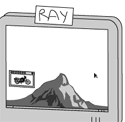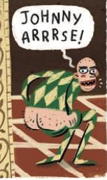|
Haystack posted:I suspect that alien intellence would be much less incomprehensible than some of you all seem to believe. Covergant evolution is a thing. If you want a real life example then just look at octopuses, who evolved near-sapient level intelligence almost entirely independently of mammalian intelligence. You're calling this an argument FOR comprehensibility!? 
|
|
|
|

|
| # ? Jun 5, 2024 17:59 |
|
Inexplicable Humblebrag posted:what do you mean by this? i'm unable to find any decent plot summaries of the stableford stuff but even still, none of them mention conciousness in any way Brian Stableford is a longtime sci-fi/fantasy author (see a huge list of his books here) who has explored all kinds of topics. I'm mentioning this overview as kind of a shill, but - anyways, the Werewolves of London trilogy / David Lydyard trilogy is a kind of weird-rear end fusion of the occult and fantasy and sci-fi and I hesitate to give away anything, but heck with it, it's not online otherwise: spoilers for the final book of the trilogy, Carnival of Destruction, so the angels - the higher beings that have been granting visions and powers, and all other kinds of things - are, effectively, aliens who don't recognize consciousness, kind of? (Working from memories, haven't read the book in a while, probably due for a reread.) But the idea is that aliens are busy with their ongoing 4X, paying no mind to the smaller things like us humans, and that the act of becoming aware of us, making themselves capable of being aware of us, diverts them from their ongoing game for power/survival/resources. There's more, of course, and conveying this information to the humans is a fascinating denoument, but that's the general thrust I remember. So it's like Blindsight yet not? I want to emphasize that the aliens are not like, conscious as we'd think of it, it's not like they're choosing to be the way they are or vise-versa. Which all works with the supernatural themes too, things aren't inherently knowable per se. I don't know. I should reread the book. But it was such a shock to realize that Blindsight is playing in the exact same spaces. Anyways, this has been a fantastic page or two on this topic, y'all are insightful and good posters.
|
|
|
|
Yngwie Mangosteen posted:I am more or less always disappointed in the alienness of aliens, it's my main gripe with the Becky Chambers novels, they're very surface level differences. That's not a swing at her, I can't come up with better ones, I just want Weird aliens. Solaris, Pattern Jugglers from Revelation Space, and Arrival are maybe the best examples I've found but it's mostly because they're all very, very unexplained. The cheela from Dragon's Egg are biologically really weird but otherwise very human in how they act and react to things, things like The Thing/Blob are deeply alien and unknowable but it's hard to get deeper into them because of the nature of them. The Scramblers from Blindsight are kind of my top 'weird' aliens because the idea of a race of p-zombies is new and I liked the thing where they could identify and move between the timing of an eye performing saccades and other tricks that use our biology against us. Re Arrival, you should also get the short story collection that contains its inspiration. Really-alien-alien content isn't constant, just Ted Chiang rules.
|
|
|
|
That's how I first encountered the story! Ted Chiang is fantastic. Haystack posted:I suspect that alien intellence would be much less incomprehensible than some of you all seem to believe. Covergant evolution is a thing. If you want a real life example then just look at octopuses, who evolved near-sapient level intelligence almost entirely independently of mammalian intelligence. Earth still has a pretty narrow range of parameters for earth-like life that may or may not be necessary for life to arise. Nothing we know of guarantees life that even requires carbon much less all the various conditions that exist/ed on Earth through its history. All life on earth exists in a fairly narrow continuum of possibility, and the further you get from that the further the assumptions that can be made.
|
|
|
|
My favorite part of Blindsight was the part where Saresti the vampire pilot is revealed to be an AI in a vampire suit; piloting an empty corpse because the humans wouldn't listen to an AI
|
|
|
|
Is that revealed or just left uncertain?
|
|
|
zoux posted:Is that revealed or just left uncertain? he just tells Siri.
|
|
|
|
|
Pinterest Mom posted:Right, the idea is that humans are pretty rare in the universe. Sentience and self-consciousness as we understand them are evolutionary dead-ends, and the dominant form of life is pure information processor. Other forms of life don't sit around thinking about themselves or trying to entertain themselves, they don't waste the CPU cycles or energy. Humans are sitting around sending out a whole bunch of garbage information in the world, and aliens experience "I Love Lucy" reruns as meaningless garbage noise that ties up their CPU cycles in trying to process. When some form of life is capable of traveling between solar systems, why is "waste" such a huge concern? Interstellar travel sort of implies overcoming scarcity for the life that achieves it. In evolution, efficiency in the abstract is not the main trait selected for. The importance of sexual selection in some species means efficiency is sometimes even selected against. When scarcity is not an immediate obstacle, evolution can take interesting paths. The idea of self-consciousness as wastefulness seems less like an idea from biology, and more like an idea from contemporary capitalism and Christianity. What if Weber's Protestant Work Ethic was made into a biological imperative? Even how waste is defined is determined by wider social relations. For an obvious example from the US - social safety net payments to keep the poor alive get called wasteful but corporate profits that get spent on mansions and empty condos for the rich are celebrated as a success. I've read Echopraxia more recently than Blindsight so it's fresher in my brain though, and I think it is a slightly different take on the setting of Blindsight. The world seems more hosed up and an extrapolation of our own than "the shiny new post-scarcity economy" described in Blindsight. The retreat of people into VR is shown to be driven by the collapse of systems, both political and environmental, in real life. This could be because of a shift in narrators, a biologist versus a "synthesist," but I think Watts had a different idea of what the situation on Earth was overall. At the same time, the explorations of consciousness are even more far out. There's a hive mind of space monks. Watts makes the vampires in Echopraxia so smart it's basically magic. Self-consciousness is basically described as some sort of original sin that removed humanity from the divine. Considering the importance of religion as a theme in that book, I think that's pretty much intentional by Watts. I just started Exordia, and the setup that souls are an objective fact seems like a pretty fun response to Blindsight and Echopraxia.
|
|
|
|
Ravenfood posted:You should read more CJ Cherryh. i will not be peer pressured into reading cherryh because they're not available on my library ebook pattern Yngwie Mangosteen posted:Nothing we know of guarantees life that even requires carbon sorry, have to put on my nerd hat here. guarantees? no. but there are very solid Chemistry Reasons (primarily carbon's ability to form stable bonds with itself and a shitload of other elements) to believe that life will be carbon-based it's fun to speculate about life based on silicon or, idk, boron, or quartz, or magical star bullshit! but i reckon any life we find in this universe will be carbon-based
|
|
|
|
redleader posted:i will not be peer pressured into reading cherryh because they're not available on my library ebook pattern Most of Cherryh's stuff isn't in ebook format at all and it makes me so sad  (but not sad enough to type it up myself, that's a shitload of work
|
|
|
|
redleader posted:i will not be peer pressured into reading cherryh because they're not available on my library ebook pattern Sure, absolutely, that was a bit of hyperbole to drive the point home. But even something relatively small in terms of a change like carbon based life that survives mostly in a band of 200-300*F temps rather than 0-100*F is still going to have wildly different ways of understanding and interacting with the world, and that's going to fundamentally alter the way that any intelligence comes together. Or anaerobic carbon-based life on a planet where oxygen is a trace element. Or whatever other parameter you want to alter. But even if everything was exactly the same in terms of environment somehow, we still represent a single type of life that all grew and branched off from the same starting point. We, in fact, remain basically really hosed up fish in a lot of really major ways.
|
|
|
|
Fortress in the Eye of Time (Fortress #1) by CJ Cherryh - $3.99 https://www.amazon.com/dp/B000FC1S8Q/ Fortress of Owls (Fortress #3) by CJ Cherryh - $3.99 https://www.amazon.com/dp/B000FC1S9A/ Fortress of Dragons (Fortress #4) by CJ Cherryh - $2.99 https://www.amazon.com/dp/B000FC1S9K/ The Jasmine Throne (Burning Kingdoms #1) by Tasha Suri - $2.99 https://www.amazon.com/dp/B08F4YZZ84/ Realm of Ash (Books of Ambha #2) by Tasha Suri - $2.99 https://www.amazon.com/dp/B07P8LM4Y4/ Legacy (Sharing Knife #2) by Lois McMaster Bujold - $1.99 https://www.amazon.com/dp/B000SCHBV6/ Kill City Blues (Sandman Slim #5) by Richard Kadrey - $1.99 https://www.amazon.com/dp/B009NF6A7A/ Here you go guy that was waiting for this. pradmer fucked around with this message at 00:04 on Feb 16, 2024 |
|
|
|
Atrocious Joe posted:
Maybe it’s just because I read the Dawn of Everything this past year, but “efficiency” as a biological imperative definitely feels like some made up European Enlightenment bullshit. Also, evolution is just focused on survival and reproduction, right? Not efficiency?
|
|
|
|
Danhenge posted:Right, this is the bit I think a lot of people who think the premise is completely stupid don't really contend with. I'm neutral on whether consciousness is actually inherently wasteful. But it's hard to deny that many of the things "I" do happen outside the locus of my consciousness. How do I turn light hitting my eyeballs into pictures? (The neurological mechanics of vision are particularly fascinating if you've never read about them, by the by) Or sound waves into noise? If I want to speak, or walk, or dance, "I" don't engage in the movement of individual muscles or motor neurons. I am good enough at mental math that, for simpler stuff, I don't have any conscious sense of "doing" anything, the answer just arrives without apparent effort. It's hard (for me at least) to escape the sense that the self is just running herd over a lot of little scramblers doing their own thing without my direct oversight. How important is that loop of self-awareness in that whole process? I don't know. I certainly like it, and I think I would prefer a universe where it was the norm, but I'm not confident of its necessity. Yeah, I didn’t think the premise is stupid, I just don’t like how Peter Watts presents the premise as horrible and awful and terrifying like he’s Lovecraft screaming at the horror of his own brain. Like I will never fully understand all the unconscious processes underlying my consciousness. I’ve disassociated a few times in my life, so I can no longer fool myself that my conscious self is in total control of me—and that’s fine. My subconscious is like a big black box that takes a ton of inputs and gives me readouts in the form of intuitions and inspirations, and I’m comfortable just riding on top of it cause usually my own brain is pretty good at steering me the right way rather than constantly loving poo poo up. I suppose it’d be more horrific to someone who wakes up covered in blood on the regular or some poo poo Also I think consciousness of some kind evolved as a method of error correction that’s too useful to be called parasitic. Symbiotic more like Stuporstar fucked around with this message at 00:28 on Feb 16, 2024 |
|
|
|
Yngwie Mangosteen posted:Sure, absolutely, that was a bit of hyperbole to drive the point home. But even something relatively small in terms of a change like carbon based life that survives mostly in a band of 200-300*F temps rather than 0-100*F is still going to have wildly different ways of understanding and interacting with the world, and that's going to fundamentally alter the way that any intelligence comes together. Or anaerobic carbon-based life on a planet where oxygen is a trace element. Or whatever other parameter you want to alter. But even if everything was exactly the same in terms of environment somehow, we still represent a single type of life that all grew and branched off from the same starting point. We, in fact, remain basically really hosed up fish in a lot of really major ways. i do recognise that "give me all the gory details of the hosed up chemistry and chemical biology you've invented for your aliens" is a pretty small niche, but it would absolutely tickle my fancy
|
|
|
|
redleader posted:i do recognise that "give me all the gory details of the hosed up chemistry and chemical biology you've invented for your aliens" is a pretty small niche, but it would absolutely tickle my fancy I love that poo poo so much, I’d read a whole made-up biology book about scifi aliens
|
|
|
|
pradmer posted:... How exciting, this opens up books 5 through 12. I wasn't planning to check book deals today so this would have slipped by.
|
|
|
|
Ravenfood posted:You should read more CJ Cherryh. CJ Cherryh's got a short story in my favorite sci-fi anthology. I got it when I was a kid:  I loved the first half of this book, which is all about actual cats in sci-fi settings. The second half I didn't like at all, and I've avoided it on subsequent re-readings. The story "Chanur's Homecoming" is chapter 12 of a novel, and it certainly felt that way as a kid. In fact all the "alien cat" stories felt like someone flipped open to a random chapter of a book and asked me to read it. But I can't get enough of the first half of this book. Does anyone have more sci-fi short stories involving cats and/or dogs as the main plot point (preferably where they don't die gruesome deaths; the stories in Cats in Space are pretty kind towards the kitties)?
|
|
|
|
redleader posted:i do recognise that "give me all the gory details of the hosed up chemistry and chemical biology you've invented for your aliens" is a pretty small niche, but it would absolutely tickle my fancy Hell yeah
|
|
|
|
LifeLynx posted:I loved the first half of this book, which is all about actual cats in sci-fi settings. The second half I didn't like at all, and I've avoided it on subsequent re-readings. The story "Chanur's Homecoming" is chapter 12 of a novel, and it certainly felt that way as a kid. In fact all the "alien cat" stories felt like someone flipped open to a random chapter of a book and asked me to read it. But I can't get enough of the first half of this book. Does anyone have more sci-fi short stories involving cats and/or dogs as the main plot point (preferably where they don't die gruesome deaths; the stories in Cats in Space are pretty kind towards the kitties)? I was gonna recommend Fritz Leiber's "Space-Time for Springers," but I see it's already in that anthology. Diane Duane has a trilogy about cat wizards, starting with The Book of Night with Moon, but there are some deaths.
|
|
|
|
redleader posted:i do recognise that "give me all the gory details of the hosed up chemistry and chemical biology you've invented for your aliens" is a pretty small niche, but it would absolutely tickle my fancy I love SF like this, or "here's 500 pages about how the nuclear salt water rocket works. oh was there supposed to be a story here?"
|
|
|
|
I'd read a Xenobiology textbook
|
|
|
|
VostokProgram posted:I love SF like this, or "here's 500 pages about how the nuclear salt water rocket works. oh was there supposed to be a story here?" You would love Robert Forward if you haven’t read him already.
|
|
|
|
oh gently caress yeah he's going on the listRobert Forward's wikipedia article posted:He described his first novel, Dragon's Egg, as "a textbook on neutron star physics disguised as a novel."
|
|
|
|
Gaius Marius posted:I'd read a Xenobiology textbook Wayne Barlowe’s Expedition is a must-read, though it’s more a zoological study as the human observers aren’t doing dissections or tests.
|
|
|
|
I enjoyed A. K. Dewdney's The Planiverse, which was mostly an exercise in working out biology for a two-dimensional world.
|
|
|
|
Atrocious Joe posted:When some form of life is capable of traveling between solar systems, why is "waste" such a huge concern? Interstellar travel sort of implies overcoming scarcity for the life that achieves it. You will run out of space shockingly fast on an evolutionary timescale. It took far longer for Earth to get around to eukaryotes than it would for a halfway competent slower than light colonizer to fill up the whole galaxy.
|
|
|
|
How much of Blindsight is based on the twist the aliens aren't fully conscious and consciousness is an "evolutionary dead end"? It's something I've heard about it a lot, and people say it's very based on a twist, but I don't know if that's it.
|
|
|
|
Hiro Protagonist posted:How much of Blindsight is based on the twist the aliens aren't fully conscious and consciousness is an "evolutionary dead end"? It's something I've heard about it a lot, and people say it's very based on a twist, but I don't know if that's it. The book is excellent sci-fi / horror on a lot of levels, and its strength isn't in a twist, but the crashing realization of everything that's happened up to that point is very effective. If you've read all the posts in the last couple pages, it will probably reduce your enjoyment of the book. The relative lack of spoiler tags has been pretty disappointing.
|
|
|
|
Hiro Protagonist posted:How much of Blindsight is based on the twist the aliens aren't fully conscious and consciousness is an "evolutionary dead end"? It's something I've heard about it a lot, and people say it's very based on a twist, but I don't know if that's it.
|
|
|
|
Kestral posted:The book is excellent sci-fi / horror on a lot of levels, and its strength isn't in a twist, but the crashing realization of everything that's happened up to that point is very effective. If you've read all the posts in the last couple pages, it will probably reduce your enjoyment of the book. The relative lack of spoiler tags has been pretty disappointing. Thankfully I'd already heard that spoiler (though it was probably earlier in the thread anyway). It feels very nihilistic, in a way, which is why I haven't felt too upset, as that isn't usually my type of story, but this thread's love of it made me wonder if the spoilers and messaging made it still work reading regardless.
|
|
|
|
Major Ryan posted:I also bought and read Cast in Shadow after SkipNebulossa's recommendation and it would definitely be the writing style that put me off reading any further. The characters were fine, the plot actually wasn't half bad, the lore and world building obviously made up a really good chunk of the book and you could see that really becoming A Thing over multiple books. I can see why this would be a favourite series for someone, but it wasn't really for me. I'm going to try to explain why the writing gets so much in the way of my ability to read, but this is one of those excessive explanations and all I can say is my internal response to the sentence is getting unpacked here just as you might explain a joke--which usually ruins it. I do wonder if part of my response isn't the difference between being an internal-audio reader versus a visual reader: I hear words when I'm reading, generally, and if I read fast enough not to, I'm not going to enjoy what I'm reading. My copy of the book includes a sample from the beginning of Book 2, and the first sentence stopped me in my tracks: Cast in Courtlight preview posted:In the old days, before the Dragon Emperor--sometimes called the Eternal Emperor by those responsible for toadying--had invested the Halls of Law with the laws which governed the Empire, angry Dragons simply ate the idiots who were stupid enough to irritate them. First prepositional clause, "In the old days," establishing we're talking about some time ago. OK. Second prepositional clause, "before the Dragon Emperor--" and suddenly I'm halted before the verb by an aside, instead of getting "had invested the Halls of Law..." so I'm suspended. Augmentation or further description of the Dragon Emperor as an aside: "--sometimes called the Eternal Emperor by those responsible for toadying--" and that additional information tells me people suck up to the Dragon Emperor by calling him "Eternal." There's an irony here in talking about something that happened before the "Eternal Emperor," but nothing textually acknowledges it. And the aside is passive voice (The Dragon Emperor is sometimes called the Eternal Emperor BY...) with the theoretically active speakers calling the Dragon Emperor "eternal" identified as "those responsible for toadying." I don't much like the use of "toadying" as a word here, but the whole clause is presumably about the courtiers (maybe? Who is responsible for toadying? Is it other dragons? I'm not assuming things about a world you made up and I know very little about the Emperor so far.). But I'm being given information as indirectly as grammar allows. Having been ground to a halt disentangling "those responsible for toadying" (Oh, you mean "sycophants"? Why not just write "sometimes called 'Eternal Emperor' by his sycophants"?), I'm a little lost picking up the thread with "had invested..." and realizing the sentence is saying "in the days before Imperial law" and I haven't actually gotten to an independent clause yet. Note that "invested the Halls of Law with the laws which governed the Empire" is giving me extra information. Am I shocked that the Halls of Law were invested with administering imperial law? Why not "laid down his laws for the Halls of Law to enforce," which is still a bit recursive but a little clearer? And now, the independent clause: "angry Dragons simply ate the idiots who were stupid enough to irritate them." The "simply" there makes this feel like another dependent clause, and the "idiots who were stupid" also feels redundant. Why not "angry Dragons ate those people stupid enough to irritate them."? If I were rewriting this sentence, I'd drop the whole "Eternal Emperor" aside. But if forced to keep it, I'd try this: Narsham rewrite posted:Although the Dragon Emperor's toadies insist on calling him "Eternal," in the old days, before his laws governed the Empire, angry Dragons would simply eat anyone stupid enough to irritate them. I'd really want to split this into two sentences, and either way, an opening sentence to a novel IMO should be a bit sharper. Maybe "Angry Dragons used to eat anyone stupid enough to irritate them, before the Empire formed and the Dragon Emperor laid down laws to forbid it." Apologies to anyone besides Major Ryan who plowed through that. General Battuta posted:The idea that everyone around you is just pretending to have the lights on inside and will gently caress you over the moment it's convenient—perhaps even hunt you like prey!—is pretty deeply connected to a lot of basic human fears imo. Finding out a loved one isn't who they pretended to be, seeing a community turn against you, being queer or a woman or a member of the wrong minority in some places and times (today included), hell, even the very basic 'I confided in Zelda but she told everything to Ganon and now I'm getting fired'...there are a lot of ways to run into that 'masks off' moment. My biggest problem with Blindsight is that I was totally convinced by the aliens and even maybe the vampire, although it mostly functioned as a driver of the plot and not as a coherent character. I didn't actually believe in the humanity of the human characters. It felt like Wells had an easier time writing his non-conscious aliens than he did writing a human. Nor am I inclined to think of systems as unconscious (or logical, for that matter). Most of them are deliberately designed, and I will sometimes describe them as "conscious," though not meaning quite the same thing the word normally means. We might consider an ant colony or a bee hive to possess some form of collective "conscious" mind; that's a decent way to conceptualize a system, save that most human systems are administered by human beings and thus can be considerably more complex. I admit part of that is from growing up with two parents who worked in government and dealt with different portions of a specific "system." I'll just observe that the supposed lack of control of systems tends to reflect a kind of acquired helplessness associated with learning the rules of how something works and having the job of following those rules: at this particular workplace, people like my father had the job of defining some of the rules, and that meant some degree of control over the system, even if the system could be seen as "fighting" that control. My favorite example is a story my father told: one of his responsibilities was handling parking and parking permits for a lot that held over 25,000 vehicles. This was the days when computers took up floors of buildings, so they had file cabinets full of information about permits and associated cars and license plates. He decided that much of the information they were keeping wasn't actually necessary. One of the people whose job was collecting, organizing, and filing this information complained "but the rules say that we have to collect and store all this information!" To which he responded, "who made that rule?" He did. And he had the authority to change it. Rules take over when people prioritize them over the reasons for their existence, and it's especially bad when nobody supposedly in charge of them understands why they exist in their current form. Fundamentally, it's like saying "These are the things we choose to use a computer to do" versus "These are the things a computer does."
|
|
|
|
Narsham posted:Nor am I inclined to think of systems as unconscious (or logical, for that matter). Most of them are deliberately designed, and I will sometimes describe them as "conscious," though not meaning quite the same thing the word normally means. We might consider an ant colony or a bee hive to possess some form of collective "conscious" mind; that's a decent way to conceptualize a system, save that most human systems are administered by human beings and thus can be considerably more complex. I generally appreciate the point you're making, but I don't follow you here. An ant colony or a bee hive is remarkable because it's not conscious. To the extent it has some collective intelligence it's a striking example of an intelligence without any corresponding awareness or identity. The same goes for an odd set of filing rules!
|
|
|
|
Narsham posted:I'm going to try to explain why the writing gets so much in the way of my ability to read, but this is one of those excessive explanations and all I can say is my internal response to the sentence is getting unpacked here just as you might explain a joke--which usually ruins it. I do wonder if part of my response isn't the difference between being an internal-audio reader versus a visual reader: I hear words when I'm reading, generally, and if I read fast enough not to, I'm not going to enjoy what I'm reading. “…Halls of Law with the laws” annoys me so much.
|
|
|
|
General Battuta posted:I generally appreciate the point you're making, but I don't follow you here. An ant colony or a bee hive is remarkable because it's not conscious. To the extent it has some collective intelligence it's a striking example of an intelligence without any corresponding awareness or identity. The same goes for an odd set of filing rules! I'm not read up on the hard problem of consciousness but it seems like a pretty troubling task to enumerate just what human neurons have that enables them to produce qualia that could not also be found in a sufficiently complex animal swarm intelligence or army of humans obeying written instructions.
|
|
|
|
I find both the original sentence and the rewritten one kind of annoying to read. The sentence is supposed to be funny and punchy but all this excess information is weighing it down. It could just be "In the old days, before the Dragon Emperor, angry Dragons simply at the idiots who were stupid enough to irritate them." I'd also be tempted to replace the first Dragon with Eternal so you don't get the same word repeated twice. But at the same time, having that repeated is kind of funny, introducing the idea of a dragon and then being like dragons ate people. Oh dragons. What a concept! Anyway...
|
|
|
|
FPyat posted:Wayne Barlowe’s Expedition is a must-read, though it’s more a zoological study as the human observers aren’t doing dissections or tests. Speaking of bleeding-edge imaginations. His Hell illustrations are some of the most grotesquely appealing designs I’ve come across. His concepts, whether sci fi or supernatural approach inconceivable to me. He also wrote a book to go along with his Hell stuff called God’s Demon, about a rebellion in hell . I can’t really recommend it because I’ve failed to finish it twice, it’s really, really slow - but it’s not bad or clumsy, he can write well, especially since that’s his second art. And his conception of the geographies and “geology” and hierarchies of hell and the penance of human souls are really interesting. It’s a great exercise in worldbuilding, if not plotting or characterization. zoux fucked around with this message at 04:55 on Feb 16, 2024 |
|
|
|
Gaius Marius posted:I'd read a Xenobiology textbook I also mentioned Stapledon's work when you read Lewis' Space Trilogy, which was a philosophical response to it. Star-Maker is essentially a survey text on the forms of consciousness that inhabit the cosmos.
|
|
|
|
Selachian posted:Diane Duane has a trilogy about cat wizards, starting with The Book of Night with Moon, but there are some deaths. This trilogy is a spinoff from her YA series, Young Wizards. The cat wizards series very much not YA. It's complex morally and characters die. It's also excellent as a standalone trilogy, highly recommended if you want some urban fantasy..
|
|
|
|

|
| # ? Jun 5, 2024 17:59 |
|
FPyat posted:I'm not read up on the hard problem of consciousness but it seems like a pretty troubling task to enumerate just what human neurons have that enables them to produce qualia that could not also be found in a sufficiently complex animal swarm intelligence or army of humans obeying written instructions. Among other things the brain has a stupendously, stupidly large number of connections compared to any plausible number of ants. There are lots of relatively “smart” algorithms that can be executed on very simple machines - like a bunch of ants. We don’t call those algorithms conscious just because they work. The human brain is vastly bigger and more complicated and (more importantly) has to do things like “model a body and its behavior” which seem like they could lead to consciousness. Consciousness seems to me like it’s almost certainly a specialized tool, not a woo woo general purpose result of calculations happening. It’s anthropocentric to assume that wherever math gets done or behavior gets selected a consciousness must appear. As has been mentioned upthread there’s a ton of computation that happens in our brain without any connection to consciousness. If we don’t need consciousness for these behaviors why should a far simpler system?
|
|
|

































